‘Acts of violence by Israelis against Palestinians are carried out all over the West Bank – in agricultural lands, on roads, in the streets of villages, towns and cities, and even inside homes. Settlers use violence to take over more Palestinian lands while sowing fear and terror among Palestinians and disrupting their daily lives.’
Israeli human rights organisation, Yesh Din
In recent weeks, there has been a serious uptick in settler violence against Palestinians. At least 144 incidents of settler violence were reported on Saturday 28 January alone in a series of ‘price-tag’ (retribution) attacks. These followed the shooting of seven Israelis by a Palestinian man outside a synagogue in the East Jerusalem settlement of Neve Yaakov on Friday.
However, rising levels of settler violence across the West Bank is not a new phenomenon. The UN report that 2022 was a ‘record year’ for incidents of Israeli violence against Palestinians. In their new report, Israeli human rights organisation, Yesh Din describe settler violence and the impunity it is met with by Israeli authorities as a well-established ‘system of ideological crime’ designed to displace Palestinians of their land.
The long-term impact of settler violence
In 2014, there were 28 families living in the hamlets of Mantiqat Shi’b Al Butum. But numbers have dramatically declined, families worn down by settler violence and harassment and the much reduced grazing land still available to Palestinians. Today there are barely a handful of houses still occupied, the empty homes a testament to the slow and persistent attrition caused by settler violence.
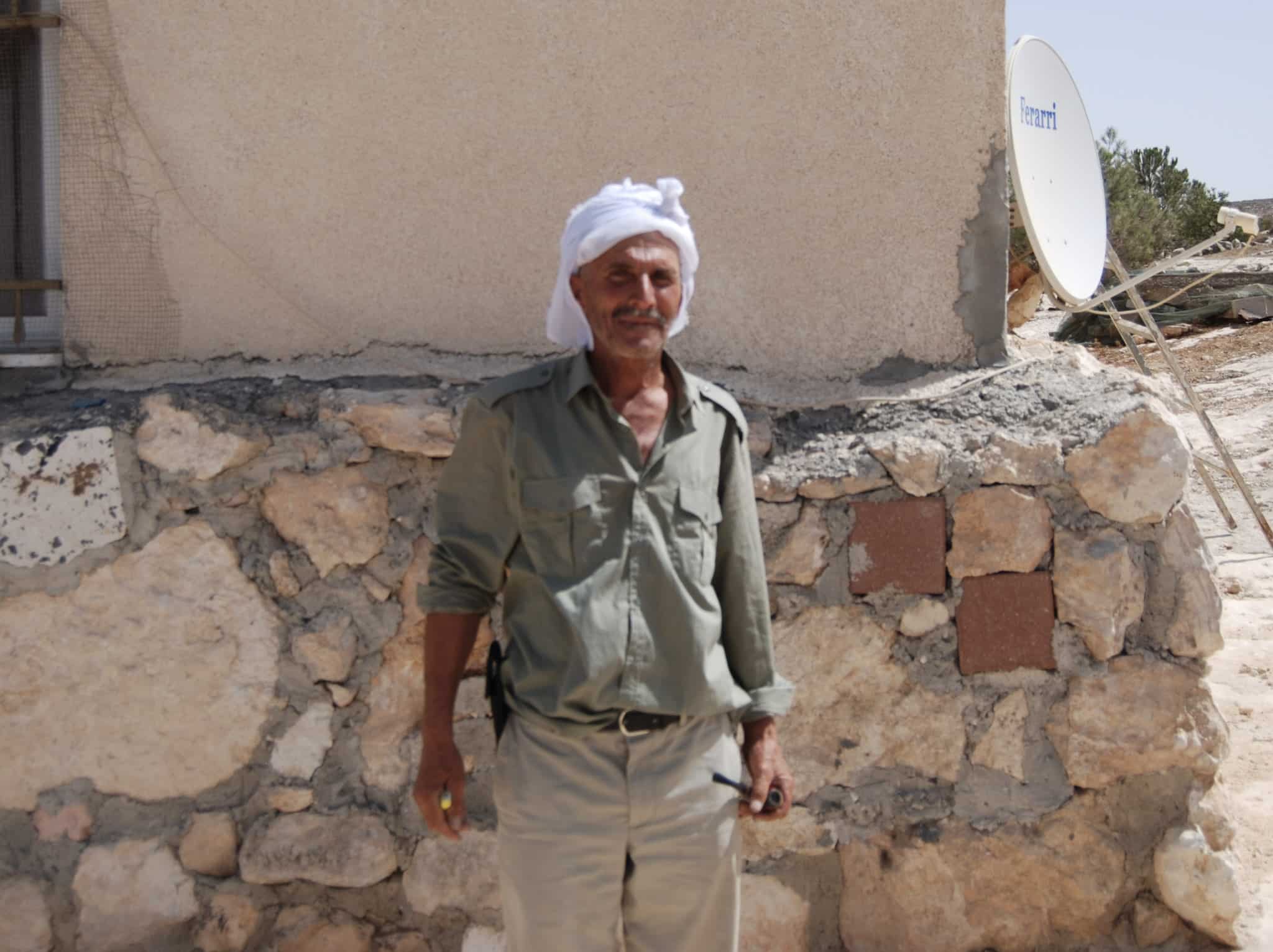
Jebreen Musa is one of the farmers who remains steadfast. He is determined not to leave his land. Last Autumn, settlers cut the water pipes leading from his well to his storage tanks. It cost him 2,000 shekels (approximately £500) to replace the 20 meters of tubing and repair the damage. He called the Israeli authorities who are responsible for the area. No action was taken.
Jebreen Musa lives in Mantiqat Shi’b al Butum, a cluster of tiny hamlets nestled in a valley in the South Hebron Hills. The communities sit at the upper and lower ends of the valley, between the Israeli settler outposts of Avigail and Mitzpe Yair, which are positioned on hilltops at the bottom and the top of the valley. Outposts are established by ideological Jewish-Israeli citizens on Palestinian land without the consent of even the Israeli authorities. Yet they are increasingly given retroactive approval and the legal right to remain, whilst Palestinians are displaced from their homes. Settlers frequently harass the hamlets in the area from both sides. There is only one road, a dusty dirt track in and out of the valley.
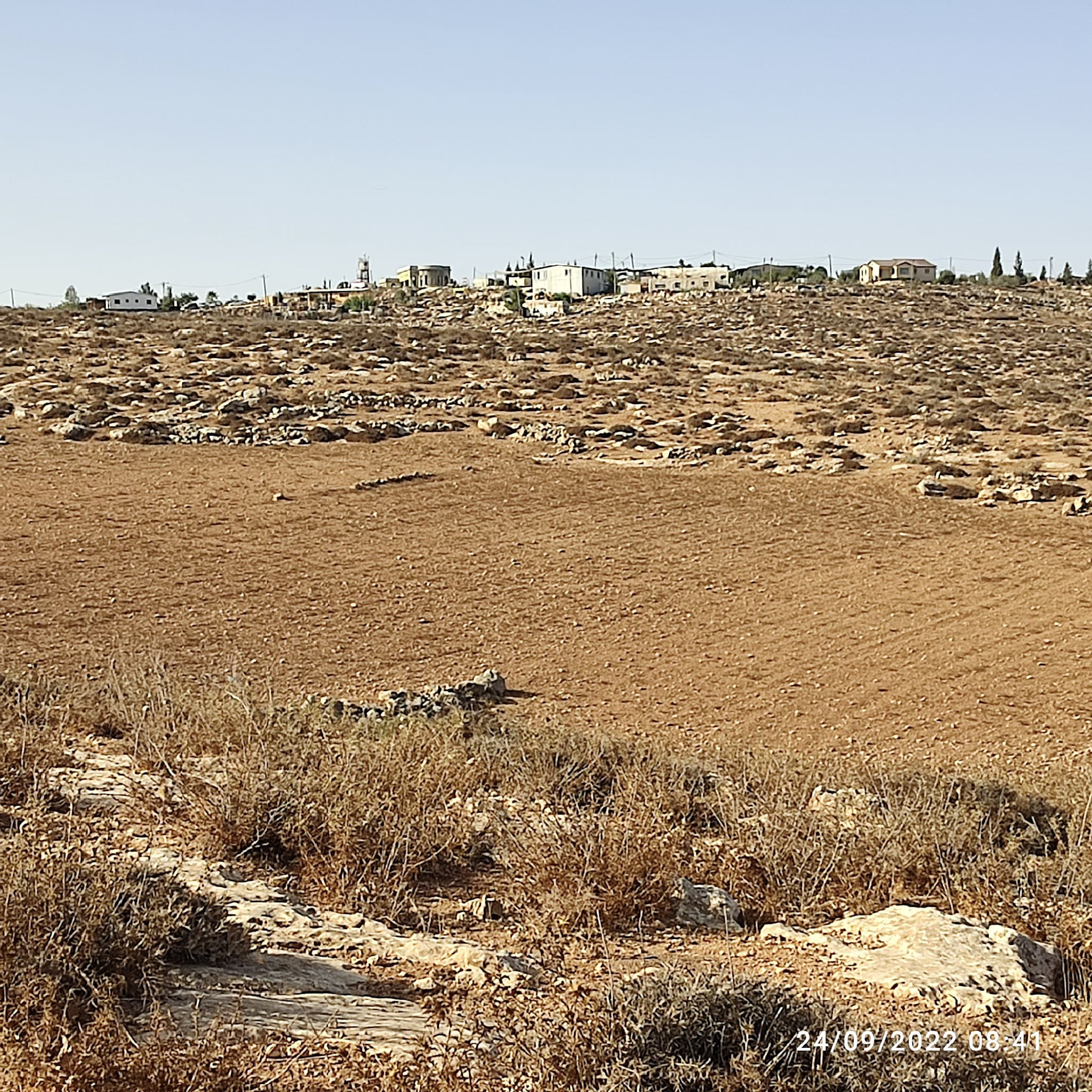
The settlement outpost of Mitzpe Yair
Jebreen Musa used to have several neighbours between him and the closest settler outpost of Mitzpe Yair, but in mid-2022, two of the families abandoned their homes and farmland in Upper Shi’b al Butum and fled to a safer area. They left behind homes they had lived in for years, with vines on the terrace and newly constructed buildings.
One of the families reported repeated harassment by settlers, who would come day and night, throwing stones, shouting, waving sticks and weapons and shouting abuse. One day they began to harass the two young children who walked down the hills to the village school. The situation became so unpredictable that they decided to send their granddaughter to live with relatives elsewhere. Shortly afterwards the settlers tried to kick their grandson as he walked to school and that was when the family decided to leave.
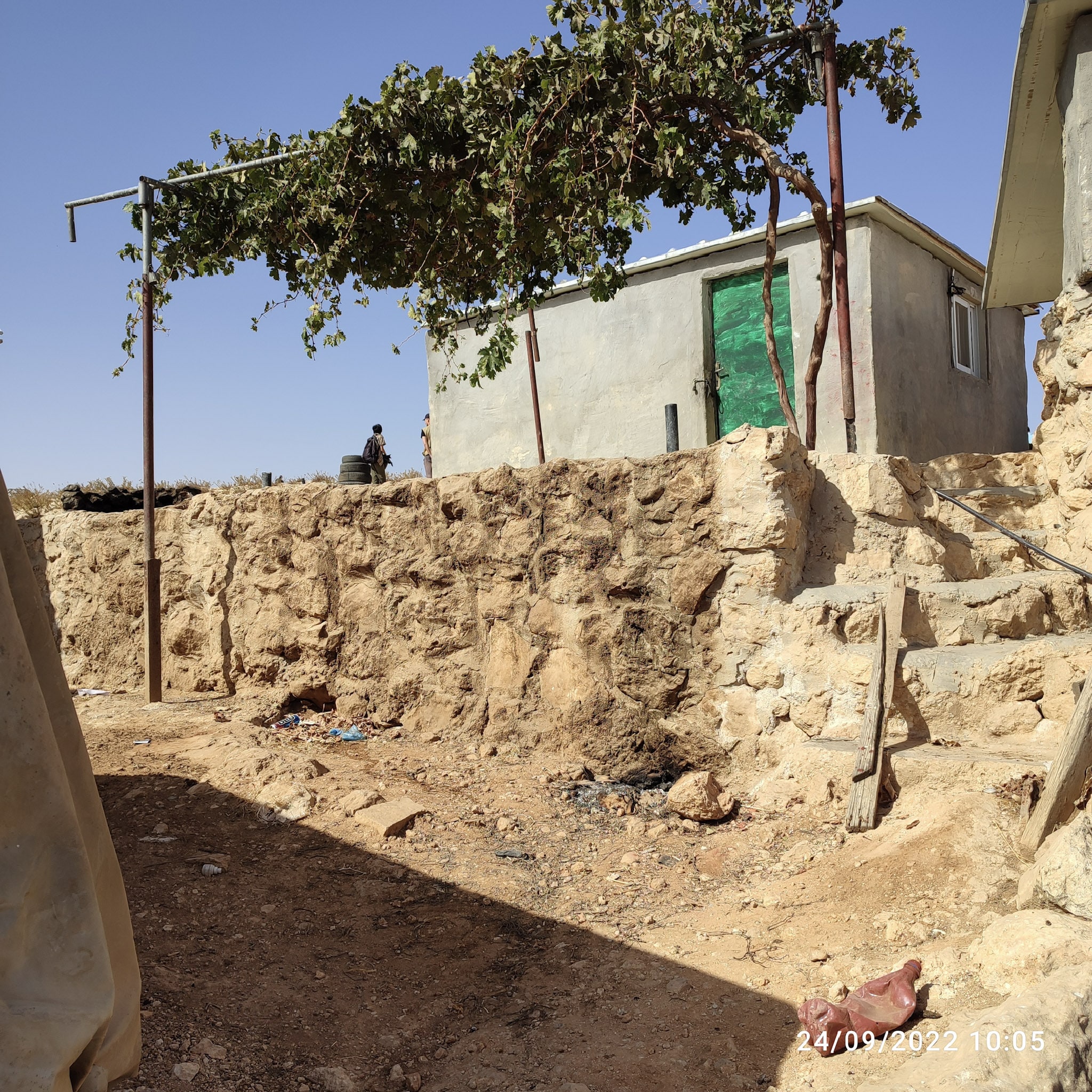
Abandoned Palestinian family home in Mantiqat Shi’b Al Butum
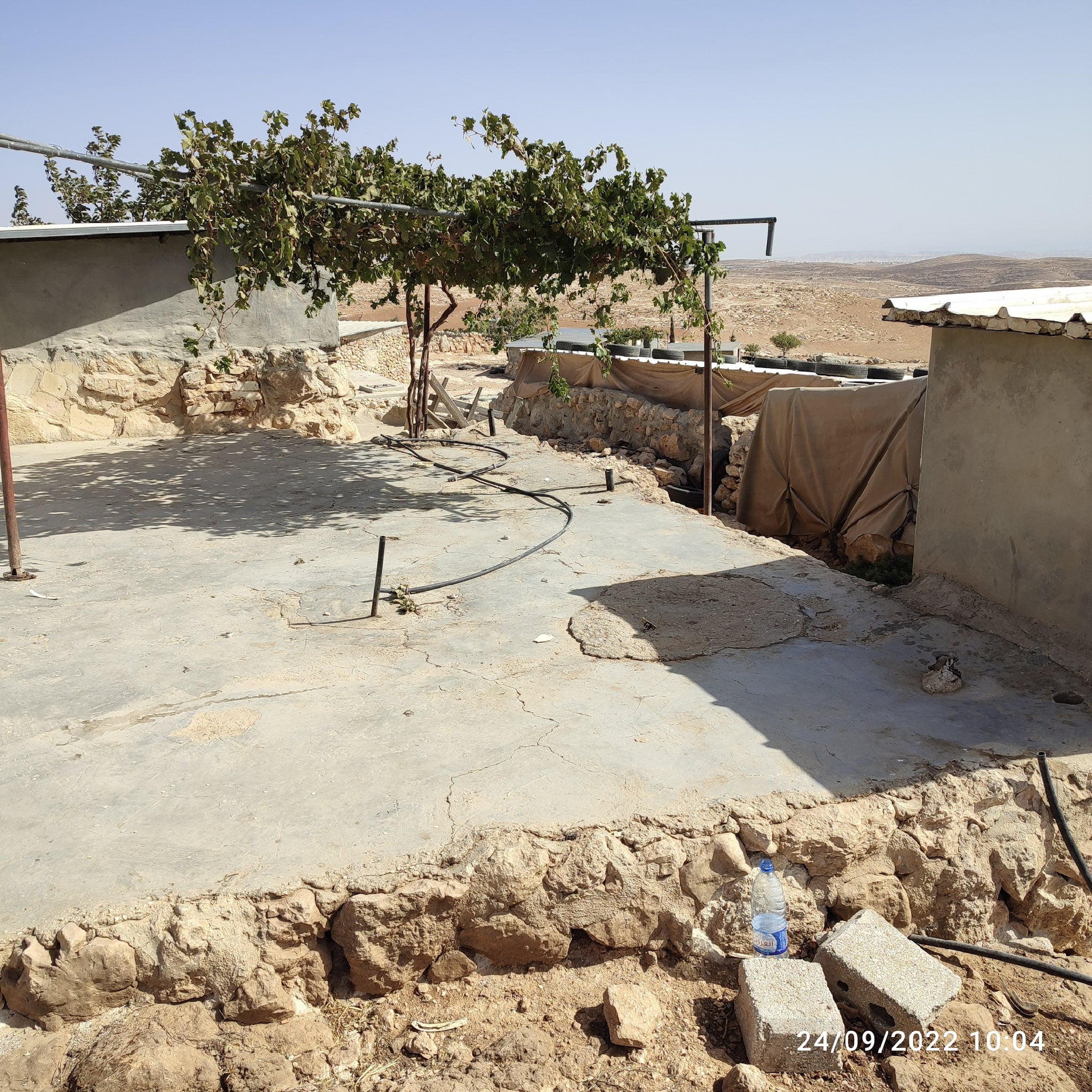
Abandoned Palestinian family home in Mantiqat Shi’b Al Butum
Next in line down the valley is Yousef*. Some years ago, settlers from the Mitzpe Yair outpost appropriated a large area of his land and built greenhouses on part of it. Together with the help of supporters, Yousef managed to get a court order to remove the greenhouses, and although it is not safe for him and his family to live on the land due to settler harassment, he goes every Saturday to work in his fields and brings his wife and young children. Israeli law states that if land is not cultivated on a regular basis, it can be confiscated by the state, so Yousef has always been careful to come weekly.
However, the Israeli court recently re-designated a large area of Yousef’s land, labelling it ‘survey land’ which means it is under government scrutiny to decide its status, and whilst this process continues – and it could take years – he is not permitted to work on it. His family used to accompany him for a picnic whilst he worked his fields, and the children would play football, but in recent months the Israeli military have prevented them from doing this. Although Yousef succeeded to get the illegal greenhouses demolished, his land in fact extends all the way into Mitzpe Yair settler outpost, and he hasn’t managed to get any of this back.

Yousef’s wife is harassed by an Israeli soldier whilst on their family land
‘The [Israeli] state takes over land openly, using official methods sanctioned by legal advisors and judges, while the settlers, who are also interested in taking over land… initiate violence against Palestinians.’
Israeli human rights organisation, B’Tselem
Most of the families in this valley are shepherds, taking out their flocks in the early morning and late afternoon to search for edible plants in the arid hillsides. They also have small olive groves and sow barley and wheat, and grow a few grapes, almonds or vegetables. The many economic restrictions of the occupation, coupled with the risk of settler violence make it very challenging to make a living. Most farmers rely on tankered water and their electricity comes from solar and wind power installed by a not-for-profit organisation COMET-ME.
‘under the pressure of violence and fear and with no other choice, Palestinian communities abandon or scale back traditional vocations such as sheep and goat farming or various seasonal crops, which allowed them to make a dignified living and live comfortably for generations.’
Israeli human rights organisation, B’Tselem
Mitzpe Yair was established as an illegal outpost in 1998. Over the years it has grown in size and population. Life has become much harder for the Palestinian farmers as the settlers have taken over more and more of their land, forcing them into smaller enclaves, so that now many of them do not have enough left to graze their flocks. They are frequently harassed by settlers who have been witnessed kicking the Palestinian’s sheep, hitting them with sticks and even stealing the sheep. The settlers regularly accuse the Palestinian shepherds of getting too close to the settlement and call the Israeli authorities, who seldom side with the Palestinians. Instead, they usually restrict the shepherds grazing access with flying (pop-up) checkpoints or roadblocks, and/or detain them for harassing the settlers or trespassing.
Jebreen Musa reports that the settlers make life for farmers in Mantiqat Shi’ib al Butum increasingly difficult. Last Autumn his cousin, Mahmoud, who also lives in the valley discovered that the settlers had come into his olive groves and uprooted or chopped down the olive trees. He has three small olive groves close to the settlement, and settlers damaged about 35 trees, slashing branches, and letting their sheep eat the tender young olive shoots. The uprooted trees were two years old. An olive tree takes five-years to produce a decent crop.
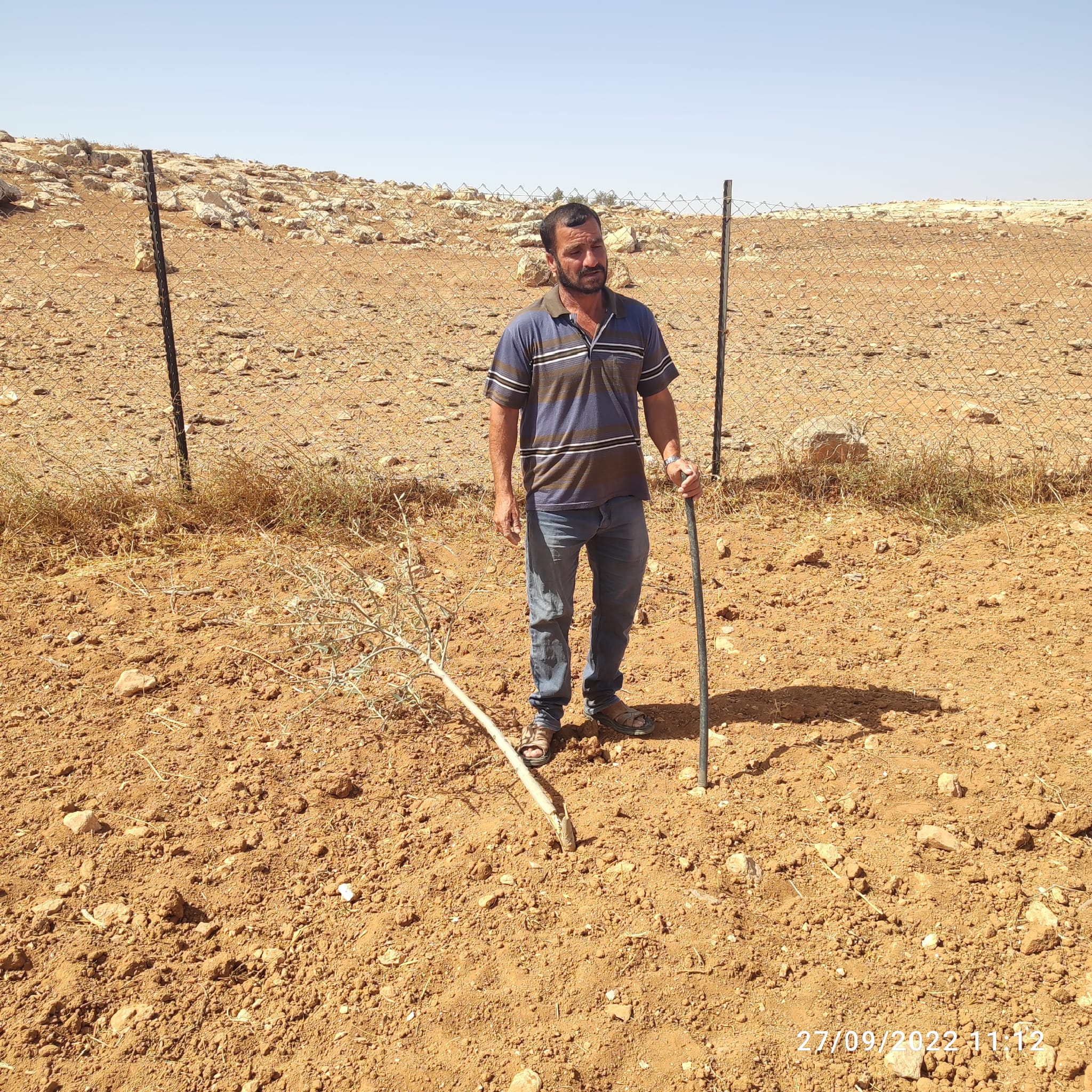
Mahmoud surveys his damaged olive trees
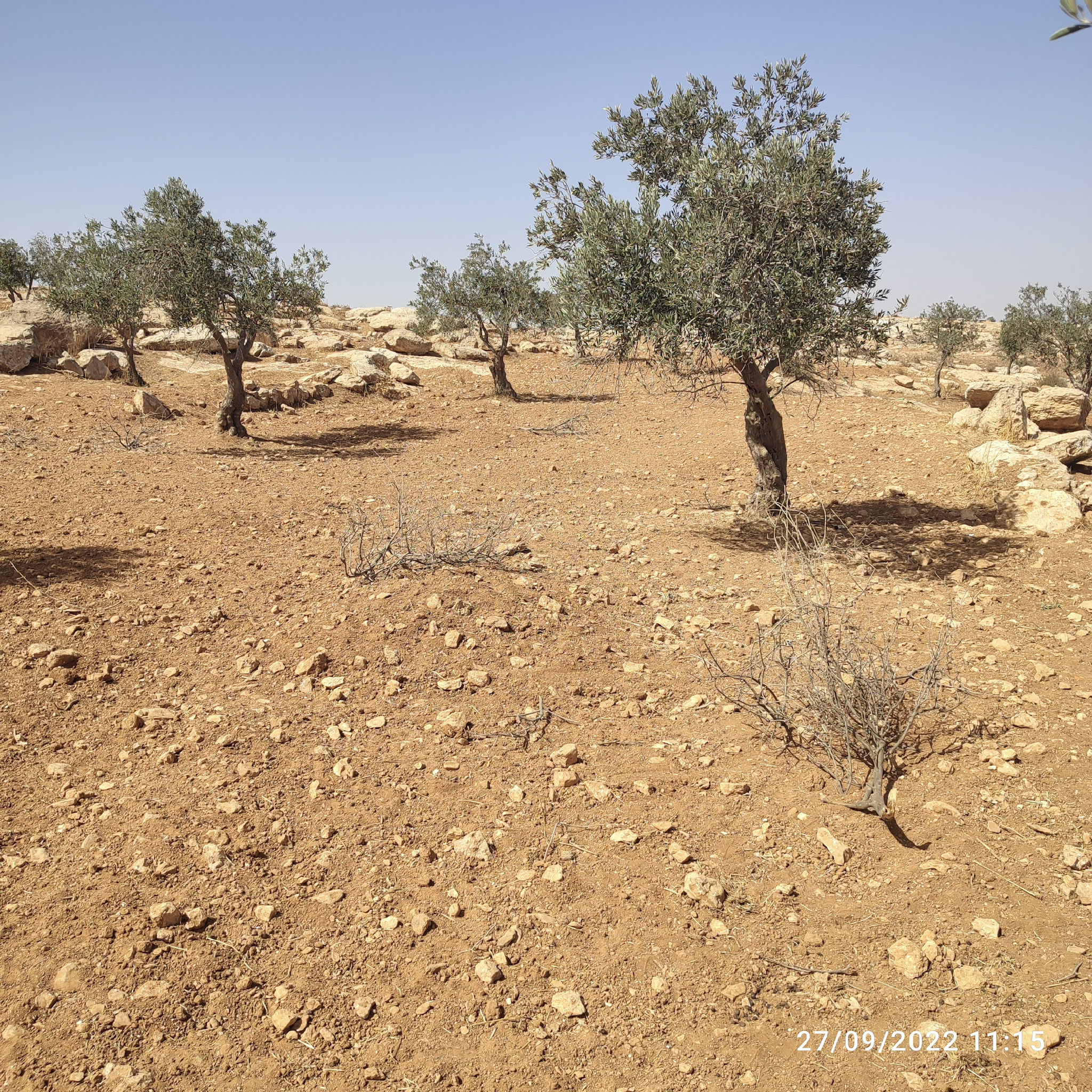
Mahmoud surveys his damaged olive trees
A week later the Israeli military placed a large boulder across the side road into the valley making it impossible to drive into Maniquat Shi’ib al Butum. It is the only road into the communities. Despite all these obstacles, as he says, Jebreen Musa will persevere;
‘because this is our home and it is the land of our forefathers, and we will endure.’

By enabling the expansion of illegal settlements on Palestinian land and seldom holding settlers accountable for violent crimes against Palestinians, Yesh Din argue that;
‘the State of Israel normalizes and supports ideologically motivated violence perpetrated by Israelis against Palestinians in the West Bank as a matter of policy and benefits from its effects.’
The recent violent escalations come in the wake of Israel’s most right-wing government to date being sworn into power. Many human rights commentators anticipate that this will continue to embolden settler violence against Palestinians and in turn make the ‘system of ideological crime’ more pronounced. In response to the East Jerusalem attack, Israeli Prime-Minister Benjamin Netanyahu promised to ‘strengthen’ the settlements, making it easier for Israelis to obtain firearms.
*not his real name
Take action!
Violence against Palestinians in the West Bank is escalating at a rapid rate. Please take URGENT action:
-
In the UK? Sign this MP email petition from our friends at Medical Aid for Palestinians.
-
In Ireland? Use our quick template letter to send this eyewitness story to your TDs urgently and ask them to support meaningful investigation into these violations of international law.

